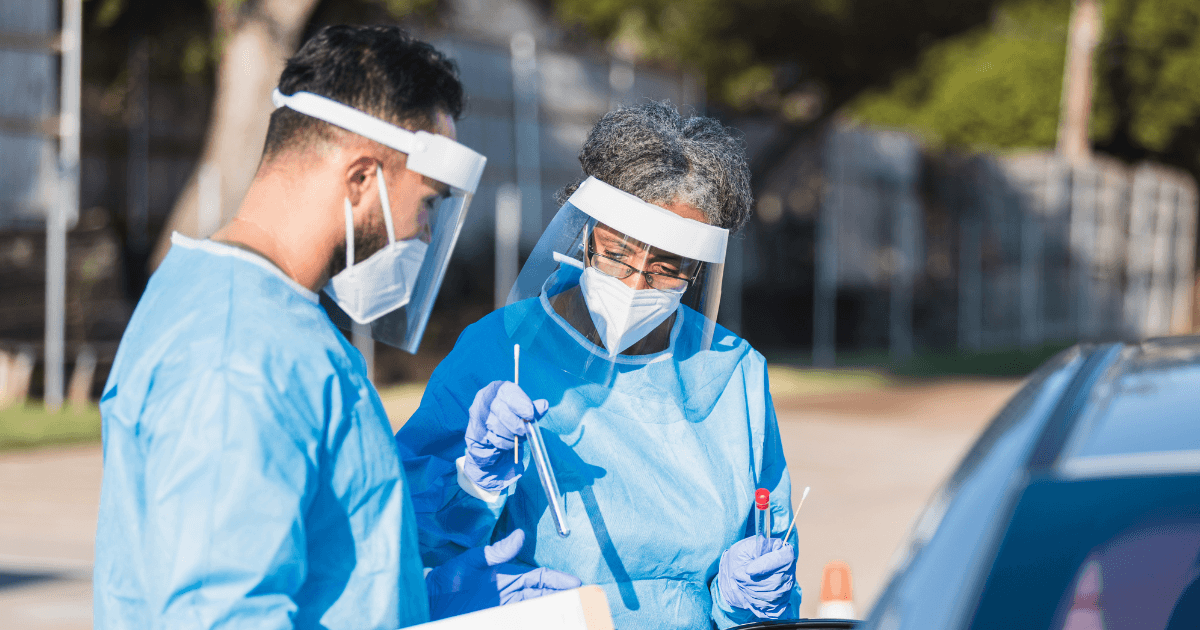Pandemic Stress Check: What Are the Symptoms of Mental Strain?

8 Minutes

Team Curative

Jan 22, 2022
As a result of a prolonged pandemic, many of us are feeling mental strain.
This page explores what might cause mental strain (stress and anxiety) during the pandemic, how to check to see if you’re experiencing more mental strain than is normal, and how to get help with your mental health to stay happy and healthy no matter what happens to be going on in each of our disrupted lives.
Are You Experiencing More Emotions During COVID-19?
What Is Stress?
What Is Anxiety?
Possible Symptoms Linked to Too Much Stress and Anxiety During the COVID-19 Pandemic
Coping With Tension During the COVID-19 Pandemic
When to Seek Professional Care
Are You Experiencing More Emotions During COVID-19?
If you are, you’re not alone. According to a recent report, 84% of Americans reported feeling at least one emotion associated with long-term stress in the past week. In that same report, the average “stress score” of Americans was 5.6, with 1 being no stress and 10 being lots of stress.
The Coronavirus has disrupted many facets of everyday living. Feeling new emotions in response to these changes is normal. However, there are two emotions which we should be trying to reduce: stress and anxiety.
What Is Stress?
Stress is a response to pressure. Something in your life is pressuring you and you feel stress because you are overwhelmed or unable to handle the situation. For example, if you have a difficult assignment at school or work that will take exactly five hours, and you have allotted exactly five hours for the assignment in your schedule, that lack of flexibility may very well lead to increased stress levels in some people.
What Is Anxiety?
Anxiety often accompanies stress, but the two emotions are not identical. Whereas stress is a response to pressure, anxiety is worry or concern over a situation. In the same example, imagine you completed your assignment successfully in the allotted time, and you just turned it in. Anxiety would be worrying about the results after you turned in the assignment.
Possible Symptoms Linked to Too Much Stress and Anxiety During the COVID-19 Pandemic
Stress and anxiety are both natural emotions to feel. And in moderation, they are in fact healthy. For example, if you have five hours to complete an assignment and you have allotted exactly five hours for yourself, stress will tell you that perhaps you need some cushion to be comfortable with the situation.
Similarly, anxiety helps you figure out situations that might need adapting to. For example, if you leave your dog in the car with the window cracked, walk 20 steps, realize it’s much hotter outside than you thought it was, and start feeling anxiety about your dog being in the car, that’s a sign that you may want to reconsider leaving your dog in the car.
Problems start to occur when stress and anxiety get out of control–which is, unfortunately, all too common in our modern society. Nearly 20% of the population suffers from an anxiety disorder. A poll conducted by Gallup revealed that 79% of Americans feel stress sometimes or frequently during their days. In particular, young adults are more prone to feelings of stress and anxiety.
The following symptoms will help you pinpoint if you may be experiencing more stress or anxiety than is natural, especially due to changes from public health measures that have been put into place as a result of the pandemic. Afterwards, we’ll go through some common health care tactics that can be used by everyone to alleviate excess stress and anxiety.
Please note that this page is not a replacement for medical advice from your primary care physician and should be used for reference purposes only.
Physical Symptoms
When you endure stress or anxiety for a long period of time, your physical body starts to respond in the form of deteriorating levels of wellness. If you are experiencing any of the following physical health issues, there is a chance that its origin is an unhealthy amount of stress or anxiety:
Headaches, Dizziness and Nausea
Rapid Heartbeat
Sleep Problems
Reduced Appetite
Lower Energy and Fatigue
Psychological and Emotional Symptoms
The side effects of unhealthy stress and anxiety unfortunately aren’t limited to your physical body. If you find yourself stressing out or feeling anxiety far more than usual, your psychological state can become affected. Common psychological side effects from stress or anxiety that has spiraled out of control include:
Overwhelming Fear
Virus-Related Insecurity
Negative Pervasive Thoughts
Loss of Interest in Daily Activities
Behavioral Symptoms
Too much stress or anxiety during the Coronavirus pandemic can also lead to changes in your behavior, both as a result of the stress and anxiety and as a result of the side effects you may experience. Common behavioral symptoms of unhealthy amounts of stress and anxiety include:
Inability to Concentrate
Irritability and Aggression
Compulsively Monitoring Coronavirus Symptoms
Frequent Crying
Alcohol, Drug and Medication Abuse
Coping With Tension During the COVID-19 Pandemic
The COVID-19 pandemic has changed and evolved since early 2020 and will likely continue to be a factor in the foreseeable future. That doesn’t mean you have to deal with unwanted tension as events unfold, though. These tips will help you reduce stress and anxiety all of the time, even if the news is chaotic and your daily life is disrupted.
Keep Your Regular Routine
COVID-19 has disrupted many areas of our lives—and this uncertainty can understandably cause stress and anxiety.
But there are still many things we do have control over in our daily routine. And ensuring we stay consistent with the aspects we can control is important for our mental health.
“Carrying out routine activities reduces stress by making the situation appear more controllable and predictable,” says Indumathi Bendi, M.D., a primary care physician at Piedmont. “Preparedness is a key way to prevent stress.”
Keep up your healthy habits to prevent unwanted stress and anxiety from cropping up.
Perform Self-Care
When things are good and life is easy, you may not feel the need to dedicate time to self-care.
However, when you start getting overwhelmed with certain aspects of your life, it’s wise to engage in a few effective self-care treatments, even as a temporary measure. They’ll make you feel good, which will take some of the burden off your shoulders and help you feel less stress and anxiety—even if you aren’t able to actually remove the thing that is causing you stress or anxiety right away, such as developments in the pandemic.
Common self-care treatments include:
Breathing, Stretching, and Meditating
Eating Healthy Meals
Exercising Regularly
Getting Plenty of Sleep
Chat With A Family Member or Loved One
Simply talking about what’s causing you stress and anxiety is helpful in reducing negative emotions.
Ideally, find someone in your life that you can call and talk to about what’s causing you to feel poorly. Just talking things out is sometimes enough to feel refreshed and confident.
In the case that you don’t have someone close to you–or you feel as if those who are close to you might not understand what you’re going through–you may instead choose to talk with a helpful stranger via SAMHSA.
You’ll be able to find local resources, such as support groups, community-based organizations, and treatment facilities (if necessary) to put you on the right track mentally.
Avoid Excessive Alcohol, Tobacco, and Substance Use
When the going gets tough, it can be tempting to turn to substances to feel better. Doing so can be very harmful in the long run for a few different reasons:
Not your expected results. Substances don’t always make us feel better, and can even sometimes exacerbate feelings of stress and anxiety.
No progress. While intoxicated, you may receive a temporary escape, but you do nothing to improve the situation that is causing you stress or anxiety.
Bad health. Intoxicating substances are generally not good for our health.
Addiction. Especially in a long-term situation like the pandemic, stress and anxiety may crop up frequently. If substances become a method of escape, it’s very easy to get addicted to them–adding to your problems instead of helping you solve them.
Monitor Exposure to Negative News
Traditional news media generally presents stories in a negative light. When you consume content that paints the world in a negative light, it’s easy to let those visuals affect your emotions negatively. Therefore, if you’re feeling excess stress or anxiety, try to limit your exposure to negative news.
Also consider avoiding social media usage—even more professional platforms such as LinkedIn. Your feed on any social media website isn’t custom tailored to your mood, so it’s possible that you will see content that will affect your emotions negatively if you decide to aimlessly scroll through your feeds.
Discuss Stress with a Professional
The first step to overcoming unhealthy stress or anxiety is realizing you might have a problem. If you’re still on the fence as to whether your life has been affected by stress or anxiety, perform a “pandemic stress test” by reviewing the physical, psychological, and behavioral symptoms stated above and discussing them with a professional.
If you feel like your life is spiraling out of control due to stress or anxiety concerns, you may choose to seek help immediately. SAMHSA is a free national hotline that can help you connect with local mental health resources that cater to you in particular.
If you feel as though stress and anxiety is having only a minorly detrimental effect on your lifestyle, you may try to fix the problem yourself with the recommended steps described in the sections above. If those steps don’t completely solve your problem, you may consider seeking professional help.
If your symptoms have gotten so bad that you are considering harming yourself, call the National Suicide Prevention Lifeline at (800) 273-8255 to receive immediate social support for your mental health problems.
Takeaway
Stress and anxiety are normal parts of our lives. But especially during the pandemic, when there have been so many disruptions to our lifestyles, stress and anxiety can grow to unhealthy levels and start affecting our lives negatively.
Take an honest assessment of your levels of tension, especially as they relate to world events. If you find that you’re feeling more stress or anxiety than usual, seek professional help or use the helpful tips described in the sections above to help reduce negative emotions and feelings on your own.
With a proactive approach to your mental health, it’s entirely possible to feel upbeat, relaxed, and free of unwanted stress or anxiety—even if the world around you seems to be completely chaotic and uncertain.
Sign up for our Newsletter
Table of Contents
Are You Experiencing More Emotions During COVID-19?
What Is Stress?
What Is Anxiety?
Possible Symptoms Linked to Too Much Stress and Anxiety During the COVID-19 Pandemic
Coping With Tension During the COVID-19 Pandemic
Discuss Stress with a Professional
Takeaway








